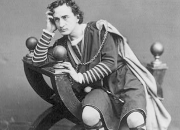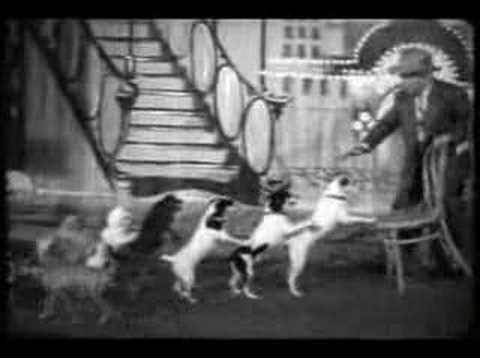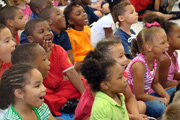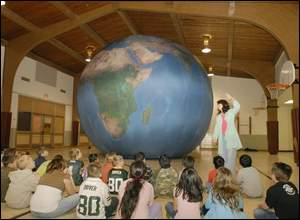 Once upon a time, this country was a simple, evolving place, with farmers and pioneers spread out all across a rapidly expanding frontier. Without television, movies or radio, entertainment was exclusively live, and often rare, according to the the geographical location of one's home. So enterprising promoters began to organize tours to bring entertainment of various forms to remote locations. Shakespearean actors brought the bard's great works to tent-theatres during California's gold rush. Vaudeville was born, with musicians, dancers, comedians and dog acts sharing stages, some grand, some primitive, in venues all across the country.
Once upon a time, this country was a simple, evolving place, with farmers and pioneers spread out all across a rapidly expanding frontier. Without television, movies or radio, entertainment was exclusively live, and often rare, according to the the geographical location of one's home. So enterprising promoters began to organize tours to bring entertainment of various forms to remote locations. Shakespearean actors brought the bard's great works to tent-theatres during California's gold rush. Vaudeville was born, with musicians, dancers, comedians and dog acts sharing stages, some grand, some primitive, in venues all across the country.
But during this period another form of traveling entertainment also began. Not all of our ancestors were interested in Vaudeville fare, or Shakespeare, and perhaps they just craved something more intellectually stimulating, desiring instead something to educate and broaden their minds. So a circuit also developed allowing writers and lecturers to tour the country speaking before interested crowds everywhere on many and varied topics. Mark Twain was among the many who pursued this path.
This touring continued for many years. But with the advent of motion pictures, radio and then television, Vaudeville passed from our age into a dusty past. Nonetheless, the lecture circuit continues even today, with august visitors most often speaking on college campuses, but occasionally in secondary schools as well. From this entrenched custom, we have a history of persons of interest visiting schools for the edification of the students. Flash forward to the modern age, and we find the current practice which has come to be known by many names according to region. In some places a school show is still referred to by the old name of "Lyceum". In other areas the term “enrichment program” holds sway. Sometimes the practice falls under the banner of “cultural enrichment”. We prefer the simple use of “school show” or “school assembly” or “school assembly program”
Regardless of how it is named in your area, the practice is now well established to one degree or another in most parts of the country.
What does it involve?
 Well, the world is full of entertainers quite eager to visit your school! Some are really amazing! Many are very good, and many are not. And quite a few, sadly, are really bad. (Some are erratic and can be great on Tuesday afternoon and terrible on Thursday morning!) But they all have one thing in common. Actors, musicians, mimes, clowns, jugglers, magicians, ventriloquists all spend a large amount of time trying to find ways to make a living. Imagine that! At some point in our history, one very clever individual hit on the idea of doing his act in a school. After all, the school already brought in guest lecturers, so why not a magician or a clown? Best of all, the PTA agreed to pay for it! And the kids loved it! And the teachers were happy for a little break from class. And everyone had a really good time. And thus was born an industry which, to this day, most of the world doesn’t know exists.
Well, the world is full of entertainers quite eager to visit your school! Some are really amazing! Many are very good, and many are not. And quite a few, sadly, are really bad. (Some are erratic and can be great on Tuesday afternoon and terrible on Thursday morning!) But they all have one thing in common. Actors, musicians, mimes, clowns, jugglers, magicians, ventriloquists all spend a large amount of time trying to find ways to make a living. Imagine that! At some point in our history, one very clever individual hit on the idea of doing his act in a school. After all, the school already brought in guest lecturers, so why not a magician or a clown? Best of all, the PTA agreed to pay for it! And the kids loved it! And the teachers were happy for a little break from class. And everyone had a really good time. And thus was born an industry which, to this day, most of the world doesn’t know exists.
But before long performers found that, many times, entertainment was just not enough. Educators made it clear that to justify taking kids out of class the programs should contribute to the educational process. Now here is where it gets really interesting! That term, “the educational process”, is open to many different interpretations. Books have been written, doctoral papers have been completed, lectures have been given and debates still rage over what exactly constitutes “the educational process”.  Some maintain that anything cultural, artistic, scientific, literate, psychological, sociological or even just entertaining (in other words, just about anything!), is an educational contribution. Others hold fast to the idea that nothing justifies taking kids out of class. “Time on task” is their mantra! While still others are comfortable with whatever content is offered as long as it is related to what students are supposed to be learning. Entertainers have been happy to oblige, turning their skills in entertainment techniques to the task of engaging students’ imaginations and getting them excited about educational concepts. What kind of concepts? All of them. You can now find multitudes of programs focusing on just about all core educational areas, as well as many areas of lesser importance.
Some maintain that anything cultural, artistic, scientific, literate, psychological, sociological or even just entertaining (in other words, just about anything!), is an educational contribution. Others hold fast to the idea that nothing justifies taking kids out of class. “Time on task” is their mantra! While still others are comfortable with whatever content is offered as long as it is related to what students are supposed to be learning. Entertainers have been happy to oblige, turning their skills in entertainment techniques to the task of engaging students’ imaginations and getting them excited about educational concepts. What kind of concepts? All of them. You can now find multitudes of programs focusing on just about all core educational areas, as well as many areas of lesser importance.
In future entries we will begin looking at different types of programs and exactly what each entails.
Geoff Beauchamp is the Regional Manager of Mobile Ed Productions where "Education Through Entertainment" has been the guiding principal since 1979. Mobile Ed Productions produces and markets quality educational school assembly programs in the fields of science, history, writing, astronomy, natural science, mathematics, character issues and a variety of other curriculum based areas. In addition, Mr. Beauchamp is a professional actor with 30 years of experience in film, television and on stage. He created and still performs occasionally in Mobile Ed's THE LIVING LINCOLN. He also spent ten years coordinating assembly programs for the elementary school where his own children went to school.






